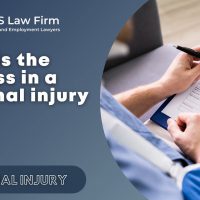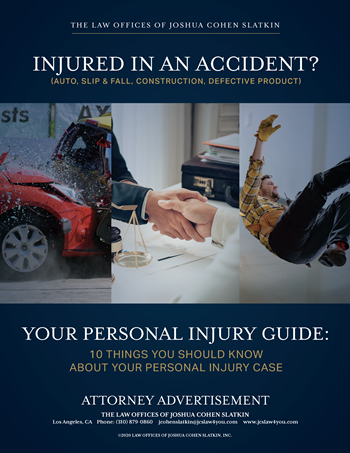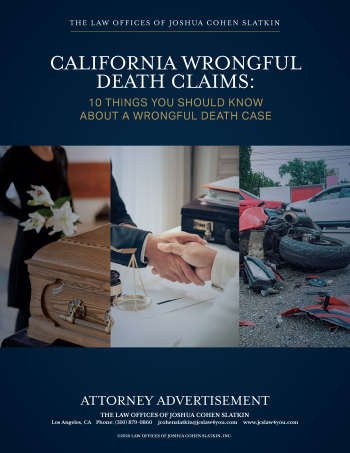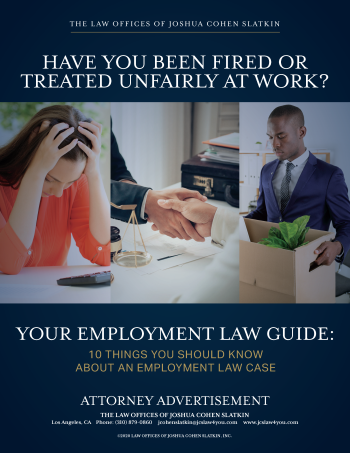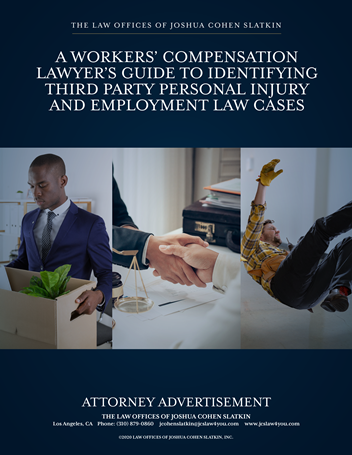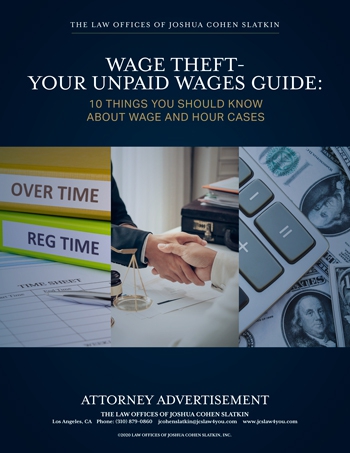Proving Employer Retaliation In California
To prove employer retaliation in violation of California Labor Code Section 1102.5 (California’s whistle-blower statute), a plaintiff who is bringing a case must show that: (1) he or she engaged in a protected activity; (2) his or her employer thereafter subjected him/her to an adverse employment action; and (3) a causal link between the two. Fitzgerald v. El Dorado County, E.D.Cal.2015, 94 F.Supp.3d 1155. “Close proximity in time of an adverse action to an employee’s resistance or opposition to unlawful conduct is often strong evidence of a retaliatory motive.” (Taylor v. City of Los Angeles Dept. of Water & Power (2006) 144 Cal.App.4th 1216, 1235, 51 Cal.Rptr.3d 206; see also Villiarimo v. Aloha Island Air, Inc. (9th Cir.2002) 281 F.3d 1054, 1065 [“in some cases, causation can be inferred from timing alone where an adverse employment action follows on the heels of protected activity”]. On January 1, 2021, Assembly Bill (“AB”) 1947 allows a court to award reasonable attorneys’ fees to whistleblower plaintiffs who bring successful actions against an employer for violations of labor code section 1102.5.
Labor Code Section 1102.5 protects any California employee who discloses information to certain parties, including the employer, if the employee has reasonable cause to believe that the information discloses: 1) a violation of a state or federal statute and/or 2) a violation or noncompliance with a local, state or federal rule or regulation. Employees are protected from reporting, disclosing, and testifying about unlawful conduct to their employer or a third-party investigative agency.
Even if the claim is unfounded or not established, as long as the complaint was made in good faith, the employee is protected against workplace retaliation.
The Supreme Court Ruling
The California Supreme Court recently ruled on January 27, 2022 in Lawson v. PPG Architectural Finishes, Inc. (S266001, 2022 WL 244731, at *8 ) that the McDonnell-Douglas burden-shifting test is not used to legally analyze the California Labor Code section 1102.5 claims. The Court must apply the burden-shifting framework in section 1102.6 which creates a much lower burden for a Plaintiff to prove retaliation under section 1102.5. Importantly, this means that an 1102.5 plaintiff is not required to show that the defendant’s proffered reason is a pretext or “a substantial motivating reason” but rather that the employee’s whistleblowing activity was a contributing factor to the adverse employment action (e.g. termination or demotion) (Id. at *7.)
Lawson defined ‘contributing factor’ to include ‘any factor, which alone or in connection with other factors, tends to affect in any way the outcome of the employment decision. (Id. at *5 (citing and quoting Rookairdv. BNSFRy. Co. (9th Cir. 2018) 908 F.3d 451, 461).) A 1102.5 plaintiff is not required to show that his or her protected activity was the only reason for the adverse action. (Id. at *5-8 (citing State Comp. Ins. Fund v. Ind. Acc. Corn. (1959) 176 Cal.App.2d 10, 17).) Contributing factor causation is a lower threshold than substantial motivating reason causation required under the Fair Employment and Housing Act. (Id.)
The Background Of California Labor Code Section 1102.5
Originally enacted in 1984, California labor code Section 1102.5 prohibited employers from retaliating against employees for sharing information the employee “has reasonable cause to believe” is unlawful. It included disclosures to government and law enforcement agencies. The provision was drafted to “encourage workplace whistle-blowers to report unlawful acts without fearing retaliation.”
Under California Labor Code section 1102.5, a former or current employee bringing a retaliation claim is merely required to show that his or her protected activity is a “contributing factor” in a prohibited action against the employee. (Lab. Code, § 1102.6.) The burden then shifts to the Defendant to prove by clear and convincing evidence that the adverse employment action (s) occurred for legitimate, independent reasons even if the employee had not engaged in activities protected by Section 1102.5. Defendant must show that the adverse action would have happened anyway at the same time as the actual decision. (See California civil jury instruction No. 4604 (citing Harris v. City of Santa Monica (2013) 56 Cal.4th 203, 224).). Under California Labor Code section 6310, it is illegal to retaliate against employees who complain, either verbally or in writing, either to their employer or to the government about unsafe working conditions or work practices.
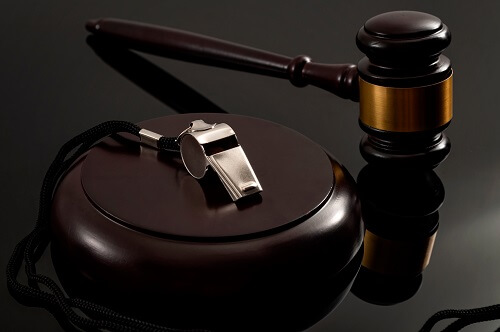
The Lawson V. Ppg Architectural Finishes, Inc. Case
In the Lawson v. PPG Architectural Finishes, Inc case, Plaintiff Wallen Lawson was a manager for paint and coatings manufacturers PPG Architectural Finishes, Inc.
Lawson told his supervisor that he would not like to take part in any such schemes. He also went on to file anonymous complaints with PPG’s ethics hotline, alleging that his supervisor was instructing him to deliberately provide customers with the wrong shade of paint in a scheme to move slow-selling products. PPG probed into the matter before instructing Lawson’s supervisor to stop the practice. However, Moore remained with PPG and continued to directly supervise Lawson and evaluate his performance.
After initially receiving positive evaluations from his direct supervisor Clarence Moore, his performance evaluations took a nosedive. Subsequently, Lawson was placed on a performance improvement plan. But, according to Lawson, Moore started instructing him “to intentionally tint the paint to a shade which the customer had not ordered” in a ploy to sell the slow-selling products and that was the reason why he was getting poor performance evaluations.
A few months later, though, Moore and Moore’s supervisor determined that Lawson failed to meet the goals outlined in his performance improvement plan and recommended PPG to fire Lawson. PPG went on to terminate Lawson’s contract.
Lawson defined ‘contributing factor’ to include ‘any factor, which alone or in connection with other factors, tends to affect in any way the outcome of the decision. (Id. at *5 (citing and quoting Rookairdv. BNSFRy. Co. (9th Cir. 2018) 908 F.3d 451, 461).) A 1102.5 plaintiff is not required to show that his or her protected activity was the only reason for the adverse action. (Id. at *5-8 (citing State Comp. Ins. Fund v. Ind. Acc. Corn. (1959) 176 Cal.App.2d 10, 17).) Contributing factor causation is a lower threshold than substantial motivating reason causation required under the Fair Employment and Housing Act. (Id.)
Moreover, on January 1, 2021, Assembly bill (“AB”) 1947 allows a court to award reasonable attorneys’ fees to whistle-blower plaintiffs who bring successful actions against an employer for violations of California labor code section 1102.5.
What The Lawson Decision Means For California Employees
Now, with the Lawson decision, an employee bringing whistle-blowing claims under labor code section 1102.5 is not required to show that the defendant’s proffered reason is pretext but rather that the employee’s whistleblowing activity was a contributing factor to the adverse employment action. Lawson defined ‘contributing factor’ to include ‘any factor, which alone or in connection with other factors, tends to affect in any way the outcome of the employment decision which creates a lower burden of proof for former employees bringing whistleblowing claims in California.


